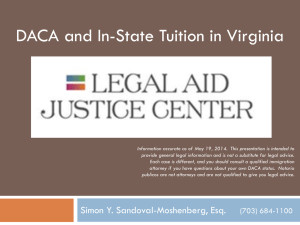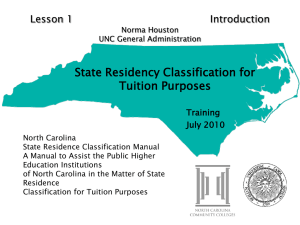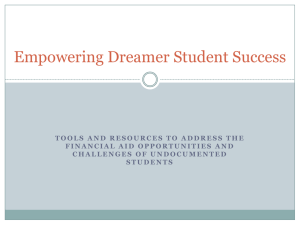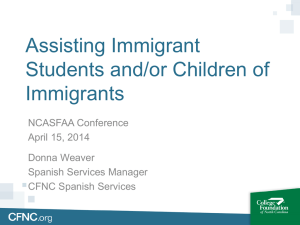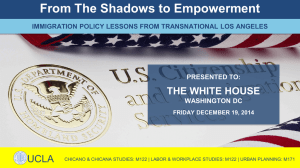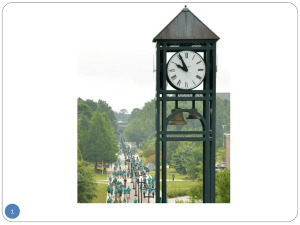Power Point Template - University of North Carolina
advertisement
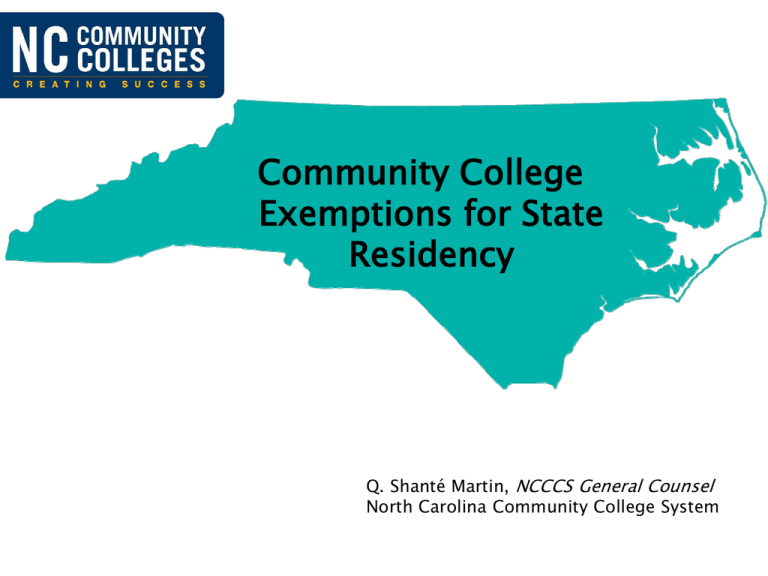
Community College Exemptions for State Residency Q. Shanté Martin, NCCCS General Counsel North Carolina Community College System • The North Carolina General Assembly and the State Board of Community Colleges, subject to its authority granted by the legislature in N.C.G.S. § 115D39(a) (2011), have determined that certain policy considerations warrant exceptions to the general rules governing in-state tuition. Business-Sponsored Students N.C.G.S. § 115D-39(a) (2011) • North Carolina law provides a special benefit to employers choosing to pay to the college the full cost of an employee’s community college tuition. Even when the employee does not meet the requirements for in-state tuition, the employer pays the tuition at the in-state rate. The law requires the employee to work at the employer’s North Carolina business location. • The burden is on the employee/student to establish that the business is a North Carolina business. • Branches of the armed services are not permitted to benefit from this provision of law. Sponsorship by Non-Profit Entity N.C.G.S. § 115D-39(c) (2011) A non-United States citizen lawfully admitted to the United States who is sponsored by a North Carolina non-profit entity is eligible for the in-state resident community college tuition rate under the sponsorship exception at community colleges when the individual establishes ALL of the following: 1) 2) 3) the individual resides in North Carolina; the individual is sponsored by a North Carolina non-profit entity; and the North Carolina non-profit entity signs an affidavit accepting financial responsibility for the individual’s tuition and other required educational fees. A non-profit entity may sponsor a MAXIMUM of five (5) non-United States citizen students annually under this exception. For the purposes of this exception, a non-profit entity is defined as an entity incorporated in North Carolina as a charitable or religious corporation or a civic league. In addition, the entity must be exempted from taxation by the Internal Revenue Code. (See Numbered Memo CC 03-163.) Prior residence in North Carolina is not required Public School Graduate N.C.G.S. § 115D-39(b) (2011) • A non-United States citizen lawfully admitted to the United States who graduates from the public school to which the student was lawfully assigned, in accordance with N.C.G.S. § 115C-366 (2011), qualifies for the in-state tuition rate at a community college. • The statute does not place a time limitation on the applicability of this exception. Thus, under the current law, a non-United States citizen who graduates from the public school to which the student was lawfully assigned in accordance with N.C.G.S. § 115C-366 always qualifies for the in-state tuition rate at a community college. Public School Graduate N.C.G.S. § 115D-39(b) (2011) • The public school graduate exception in G.S. 115D-39(c) does NOT apply to those persons born in the United States. Thus, a person who was born in the United States is not always permitted to obtain instate tuition by virtue of having graduated from the public high school to which the person was assigned. Refugees N.C.G.S. § 115D-39(a) (2011) • An individual who lawfully entered the United States and is classified for immigration purposes as a refugee shall be deemed to qualify as a domiciliary of North Carolina under G.S. 116-143.1(a)(1) and granted the in-state tuition rate by community colleges. • While the refugee is not required to be domiciled in North Carolina for the twelve month qualifying period, the refugee must live in North Carolina to enjoy this benefit. • What about asylees? “Nonresident” of the United States N.C.G.S. § 115D-39(a) (2011) • A “non-resident” of the United States who has resided in North Carolina for a 12-month (365 day) qualifying period and has filed an immigration petition (Forms I-130, I-360, or I-140) qualifies as an in-state student for community college tuition purposes. • “The 12-month (365 days) qualifying period begins at the time that a cluster of domiciliary acts is established as confirmed by valid evidence.” North Carolina State Residence Manual, § I.C., p. 5 (Fall 2010). Federal Law Enforcement Officers N.C.G.S. § 115D-39(a1) • A federal law enforcement officer whose permanent duty station is within North Carolina is eligible for the State resident community college tuition rate for law enforcement training courses. Deferred Action for Childhood Arrivals (“DACA”) June 15, 2012 - Secretary of Homeland Security, Janet Napolitano, provided direction to U.S. Customs and Border Protection, U.S. Citizenship and Immigration Services and U.S. Immigration and Customs Enforcement on how to exercise prosecutorial discretion in the enforcement of immigration laws against certain individuals brought to the United States as children. This deferral program is described as Deferred Action for Childhood Arrivals (“DACA”). Deferred Action for Childhood Arrivals (“DACA”) The Department of Homeland Security provided that individuals satisfying all of the following criteria are eligible to have removal from the United States deferred for two years: • Individuals who came to the United States under the age of sixteen, were present in the United States on June 15, 2012, and are presently under the age of thirty; • Individuals who have continuously resided in the United States for at least five years prior to June 15, 2012; • Individuals who are currently in school, have graduated from high school, or is an honorably discharged veteran; • Individuals who have not been convicted of any serious criminal offense; • Individuals who do not pose a threat to national security or pose a threat to public safety Deferred Action for Childhood Arrivals (“DACA”) On June 5, 2014, Secretary Jeh Johnson with the Department of Homeland Security announced the renewal process for individuals with DACA classification. Individuals may also apply for deferred action for the first time. Individuals seeking renewal of their DACA classification must do the following: • Satisfy initial criteria for DACA classification; • Show that they did not depart the United States on or after Aug. 15, 2012, without advance parole; • Show that they have continuously resided in the United States since they submitted their most recent DACA request that was approved; and • Show that they have not been convicted of a felony, a significant misdemeanor or three or more misdemeanors, and do not otherwise pose a threat to national security or public safety. Deferred Action for Childhood Arrivals (“DACA”) Please note that it is not within the authority of community colleges to determine who is eligible to receive DACA classification. Student applicants are responsible for presenting documentation to establish that they have DACA classification. Deferred Action for Childhood Arrivals (“DACA”) Documents that show an individual has been granted deferred action: • Form I-797-Notice of Action Form – Form will have “Approval Notice” with dates of validity – Form will provide that USCIS decided to defer action in the student’s case • Employment Authorization Card (EAD card) with Category C33 designation. Deferred Action for Childhood Arrivals (“DACA”) – In-State Tuition Per the January 22, 2014 North Carolina AG letter, individuals with DACA classification are not eligible to obtain the in-state tuition rate Deferred Action for Childhood Arrivals (“DACA”) – In-State Tuition Business Sponsorship Exception Pursuant to N.C.G.S § 115D-39(a), “when an employer other than the Armed Forces . . . pays tuition for an employee to attend [a community college] and . . . the employee works at a North Carolina business location, the employer shall be charged the in-state tuition rate.” If a student with DACA classification is employed at a North Carolina business location and the employer of the DACA student working at the North Carolina business location wants to pay for the DACA student to attend a community college, the employer shall be charged the in-state tuition rate. Deferred Action for Childhood Arrivals (“DACA”) – In-State Tuition Public School Graduate and Nonprofit Sponsorship Exception re: DACA January 22, 2014 - North Carolina AG’s Office concluded that “Under federal law, 8 U.S.C. § 1621, individuals with DACA status are not eligible to receive the benefit of in-state tuition . . . .” The January 22, 2014 letter goes on to provide that “In order for students who have been granted DACA status to be eligible for the benefit of in-state tuition, the North Carolina General Assembly would have to amend . . . 115D-39 to make an exception for such individuals . . . .” Deferred Action for Childhood Arrivals (“DACA”) – In-State Tuition Public School Graduate and Nonprofit Sponsorship Exception re: DACA Since individuals with DACA classification are not eligible to receive the benefit of in state tuition under federal law and there is not an exception for individuals with DACA classification in N.C.G.S. § 115D-39, individuals with DACA classification are not eligible to obtain the in-state tuition rate under the public school graduate exception or the nonprofit sponsorship exception
